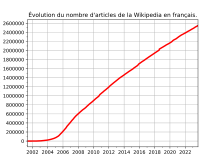User:Gereon K./Wikimania 2018
How to kick-start communities or How to boldly go where no editor has gone before
[edit]Presentation at Wikimania 2018 by Gereon K..
Sunday, 22 July 2018, 14.30h, Room Hong Kong
We seek to create a summary of all human knowledge to which everybody can contribute. But does everybody contribute? There are entire countries without a single editor. And there are Wikimedia projects that are almost dead. Now how do communities emerge, how do projects start, how can we spread our movement to places where it does not exist yet? There have been several types of approaches. Some approaches were successful, some of them were not. I would like to present past tries and discuss how to boost editor gaps. I cannot back up most of these findings with sources and graphs. The information is either from the very beginning of our projects and not available any more online or it comes from events that hardly had any reporting. I talked to many Wikipedians and this is what they remember.
Examples: How Did Communities Become Big?
[edit]German language Wikipedia
[edit]
- The German language Wikipedia was the second of all Wikipedias and has the second biggest number of active users (18,000 in the last 30 days).
- But it took 3 years until it really got a big community of contributors.
- It was only after an online article in the most widely read German-language news magazine Der Spiegel and one day later a television feature with 2.26 million viewers that many people wanted to contribute.
French Wikipedia
[edit]
- The French language Wikipedia did not go anywhere in it's first 4 years.
- Wikipedians tried to find out why not.
- They noticed that there were many demands for cooking recipes, but the encyclopedic guidelines of fr.wikipedia did not allow cooking recipes in articles.
- They had a long discussion which led to the decision to allow cooking recipes.
- fr.wikipedia sky rocketed
Austria
[edit]- For Wiki Loves Monuments Austria was the first country to have pictures of all national monuments, ten thousands of images (if you don't count Andorra).
- When they made their first regional statistic they noticed that all States of Austria were almost perfectly covered but one state.
- There was hardly any contribution from the State of Tyrol.
- They tried everything. But the contributions were only coming in, when the biggest respectively most popular radio station (Ö2) was talking about Wiki Loves Monuments.
Cameroon
[edit]
- There were 3 edit-a-thons in the Goethe Institute in Yaounde in the Central Region in 2015. So they thought they had a big community.
- It turned out that none of the participants edited after the edit-a-thons.
- This was only found out 2 years after the edit-a-thons.
Togo and Benin
[edit]- German and French Wikipedias had a huge potential from the beginning. But what about countries that do not have any community although Wikipedia is well-known worldwide?
- Example Togo. How can you start to get editors from Togo?
- The Volta region in Ghana is bordering Togo. The people there share a similar culture with their neighbors from Togo. A Wikipedian from the Volta region was going to Togo to hold a Wikipedia event there.
- But there is a major problem. Ghanaians speak English, Togolese speak French, and if you do not speak French it is difficult to converse with officials for for example renting rooms or ordering WiFi.
- With Benin it is a similar problem. Benin does not have a Wikipedia community, the neighboring Nigeria does. There are Yoruba speakers in both countries. But for official negotiations we have English in Nigeria and French in Benin.
Rwanda
[edit]
- Rwanda is the only African country that speaks a single indigenous language (Kinyarwanda). The country is IT friendly, has a steady economic rise of 8% a year since 2000 and is politically relatively stable.
- Yet there are no Wikipedia editors in the country.
- Many years ago there was a project called Rwandapedia, but this died.
- In 2017 Simon Rudolf held a presentation at the Goethe Institut Kigali.
- On the 8th of March 2018 the Swedish Embassy in Kigali held an WikiGap-edit-a-thon: WikiGap/Rwanda.
Gambia
[edit]- There was not a single editor in the country of Gambia. But before anybody from outside thought of doing outreach there, an Open Movement activist from Gambia connected to the Wikimedia movement by finding the African mailing list. In the meantime a grant for the first Gambian edit-a-thon got approved: Grants:Project/Rapid/Planning Wikimedia Gambia/Meetup.
Conclusion
[edit]What will start a community is not predictable. We can have qualified guesses that stem from experience, which might favour one method over the other, but basically we cannot predict the future. In some cases only the mass media can help, in others it is the adjustment of our principles. What we know is that edit-a-thons do not generate new editors by themselves. But we increase the possibility of gaining new editors by edit-a-thons when we follow up on them. We gave the new editors our hands, but we should keep holding their hands, not letting lose - because if we do, they're gone. They are simply going back to their everyday life after the event. And this is a place far away from our Wiki world. So far away that the forces of attraction are not strong enough to keep them editing. And sometimes a community is finding us.
All in all we have to give everything, try everything, not let out a single path of spreading our mission. One path will catch. If we want to activate editing communities we cannot do less than everything.
